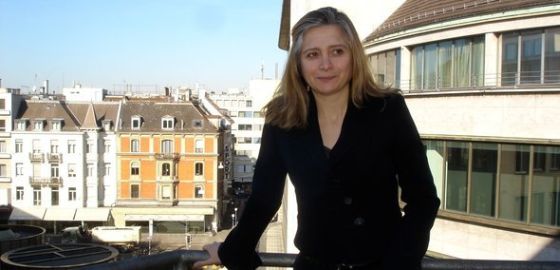
Samar Yazbek in Zurich
Aida Edemariam interviews that Syrian writer, Samar Yazbek, who comes from an Alawite family that used to be among the grandest and wealthiest on the Syrian coast.
At first, before Yazbek’s novels were published, and before she became well known as a TV presenter, documentary-maker and journalist, she lived in one room just outside the city [Damascus], working in admin for 12 hours a day, keeping herself and her daughter just above the poverty line, refusing family connections because she didn’t want to owe them anything.
It was then that she began to carry a flick-knife to defend herself, which came in handy last year, when security forces came to her home, blindfolded her and took her to a commanding officer in a place she did not recognise. He grabbed her wrists so tightly they burned, she writes, and hit her so hard she fell to the ground and stayed there. The third time he hit her, she took out the knife and he backed away, but it did not stop him from demanding she recant and fall into line with her kind. Two men took her on a tour of the cells, as a warning: she saw three young men, “their hands hanging from metal clamps, and the tips of their toes barely touching the ground”. They pushed her forward, and one raised his head. “There was a blank space where his nose should be, no lips.” More cells, a young man with his back split open, bodies stacked behind bodies, terrible sounds, terrible sights, terrible smells.
“It’s a revolution of the poor against the rich, but as they began killing people and got increasingly cruel, more people are joining the rebellion,” she says. It doesn’t matter that she is from a privileged background, and has little in common with many of those fighting. “It’s a problem of conscience. It’s not a problem of Sunni, Shiite or anything else.”
She reiterates this later. “It’s not a sectarian war. It’s a revolution. The regime makes it a sectarian crime between the people. It’s not true.
“There is a big risk, now, for the revolution – they are confronting much more repression. It’s dividing the societies in Syria and the opposition is becoming much more cruel.”
Is she losing hope of establishing the structures of civil society? “I don’t think all hope is gone. I think there are many in Syrian society who are working to keep the civil institutions. We are at a very risky point … I’m afraid that if the world doesn’t help the Syrian people now, and help to make the regime fall, Syria will be in great danger. If we get rid of Assad today, not tomorrow, it would help us to build the country normally.
“That is my hope and also my fear, because Assad takes strength from Iran, from Russia and from the non-reaction of Europeans and Americans. There is a complicity with Assad in the west, even if it’s not official, or said, or clear. But they are helping him to stay. And that is very dangerous for the Syrian people.” [Continue reading…]

